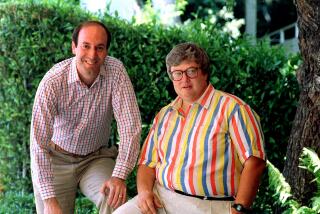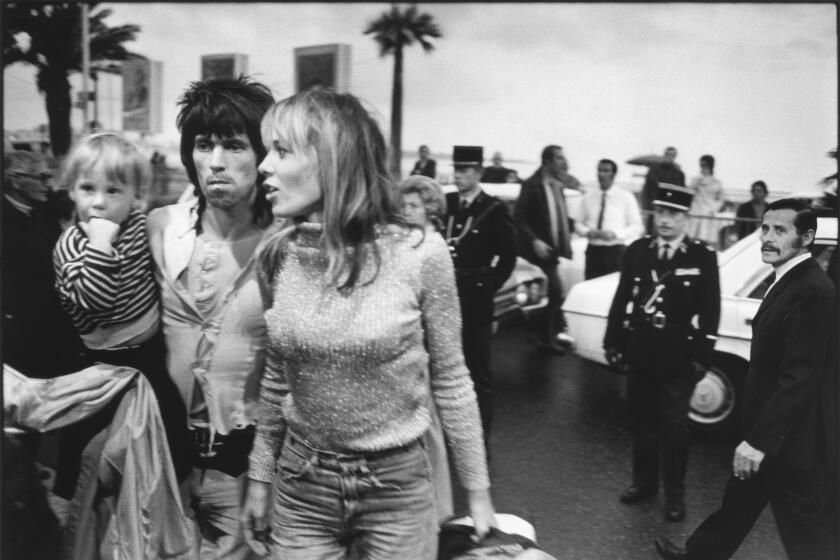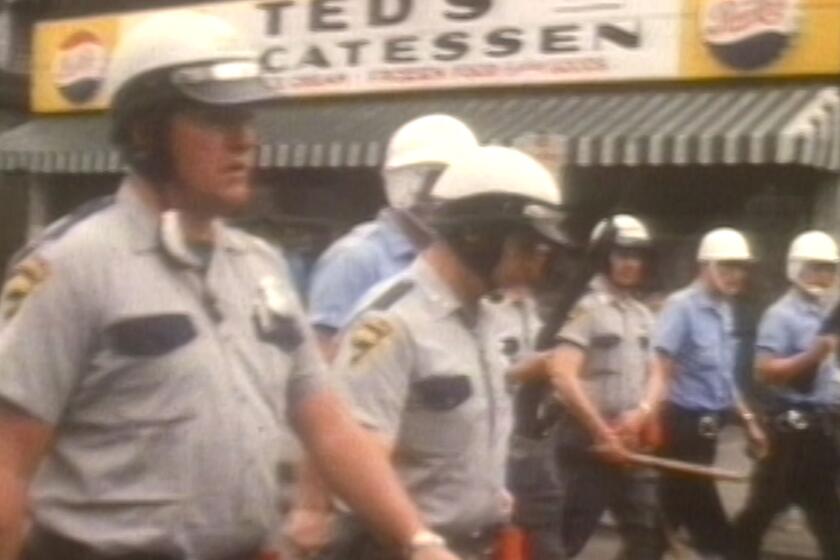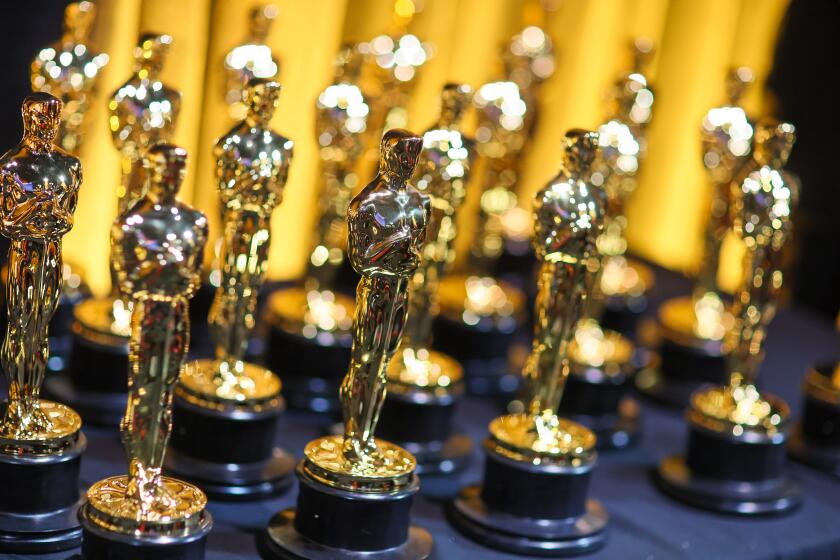Review: Jonah Hill’s directing debut, ‘Mid90s,’ is a sweet but fuzzy-headed skater nostalgia trip
“Mid90s,” the first feature written and directed by Jonah Hill, is set in Los Angeles sometime during — well, take a wild guess. One of the first things we see is a bed covered with “Teenage Mutant Ninja Turtles” sheets, followed by shelves neatly lined with CDs and cassette tapes. The sheets belong to a skinny 13-year-old kid named Stevie (Sunny Suljic), and the old-school music collection to his rough-edged older brother, Ian (an excellent Lucas Hedges).
But really, “Mid90s” insists, they belong to us. They are precious pop-cultural totems of a decade that, it may shock some in the audience to learn, now counts as period-piece material, or at least grist for a Gen-Y nostalgic trip. And since spotting the throwback references in a movie like this is part of the putative fun, I did my best to comply. I dutifully scribbled the words “‘Street Fighter II’ T-shirt” in my notebook and nodded my head appreciatively at the blips of Red Hot Chili Peppers, Cypress Hill and Wu-Tang Clan on the fastidiously arranged and undoubtedly expensive soundtrack.
By the time Stevie starts riding with a ragtag group of young skateboarders, hanging out at a local shop when they’re not out practicing their moves, you will be hard-pressed not to mentally check off “Kids,” Larry Clark’s seminal 1995 portrait of troubled New York youth. Think of “Mid90s” as that film’s kinder, more naive but also more calculating West Coast stepbrother. It’s the scrappy coming-of-age punk-hangout movie at its most ingratiating — mildly charming, unapologetically derivative and naggingly fuzzy-headed.
Derivative, of course, is not entirely a bad thing, and neither for that matter is fuzzy-headed. A nostalgia trip, in the truest sense, produces disorientation as well as recognition. It invites your willful surrender to a kind of haze, one that the movie evokes by shooting in a lyrically rough-hewn style on grainy 16 mm film, with every image framed in a boxy 4:3 aspect ratio. (The cinematography is by the gifted Christopher Blauvelt, whose work includes such fine-grained independent dramas as Kelly Reichardt’s “Meek’s Cutoff” and “Certain Women.”)
Hill is of course known primarily as a boisterous staple of mainstream American comedy, which is why there’s something disarming about his attempt to tell a sincere and highly personal story (though not an autobiographical one, as he has said in interviews). In unwieldy but admirably bold fashion, he seeks to merge his natural comic flair with an unvarnished look at a teen culture gripped by lower-depths cycles of poverty, neglect and substance abuse.
It helps that Suljic, whose unforgettable eyes you may have seen glaring out from the screen in “The Killing of a Sacred Deer,” is such an immediately compelling screen presence. The early scenes of Stevie being beaten up by his brother, or later attempting a dangerous skating stunt to impress his friends, immediately awaken your protective instincts. You may find yourself echoing the concern of Stevie’s mother, Dabney (Katherine Waterston), who is a loving but mostly ineffectual authority figure for reasons that the movie alludes to without really exploring.
The authenticity argument is one I might be more inclined to buy from a documentary or a more rigorous piece of realism.
At the same time, against your better judgment, you might begin to relax alongside Stevie in the infectious company of his skater posse, who are played by a fresh and likable group of unknowns. Stevie is befriended, if that’s the word, by Ruben (Gio Galicia), a swaggering little bully who’s eager to pass off his status as the runt of the group. Ruben’s attitude stands in sharp contrast to that of their awesomely cool leader, Ray (Na-kel Smith, a charismatic find), who welcomes Stevie with real warmth and affection.
Rounding out the bunch are an aspiring filmmaker named Fourth Grade (Ryder McLaughlin) and a rowdy, blond-maned dude who will be referred to simply as FS, his nickname being unprintable in a family newspaper. Perpetually drunk and/or high, FS is played by the skater and model Olan Prenatt, whose expletive-laden performance is both the most extreme and the most emblematic expression of the movie’s aggressive grunge-bro vibe.
About those expletives: The common defense of all this gleefully foul language, which in this case includes numerous anti-gay slurs, is that it’s an authentic expression of how these kids would talk and interact in this particular setting. The authenticity argument is one I might be more inclined to buy from a documentary or a more rigorous piece of realism, which “Mid90s,” for all its self-consciously gritty texture, is not. At a certain point, it’s hard not to wonder if the aggressive banality of much of the dialogue represents a sign of integrity or a simple failure of imagination.
A coy and cavalier scene in which Stevie experiences his sexual initiation at the all-too-obliging hands of an older teenage girl — one of the few female characters, besides Dabney, who are given anything to do — raises a similar question about the story’s perspective or lack thereof. That these things happen in real life feels less like a reason than an excuse, an attempt to keep the audience from thinking too hard about a scenario that the filmmakers don’t seem to have given their full consideration.
Less satisfying or fully formed than “Minding the Gap” or “Skate Kitchen,” the year’s other two noteworthy movies about skating subcultures, “Mid90s” possesses just enough sensitivity and feeling to make you wish it had more. Hill’s script aims for, and often achieves, a fleeting, fragmentary portrait of group dynamics, but it’s stymied in its attempts to distinguish Stevie’s pals as individuals rather than types. It longs to be received as an impeccable found artifact of its chosen decade, but also as a sly, knowing synthesis of its many obvious influences. It may be a more accurate reflection of its protagonist than it realizes: a movie that seems willing to reinvent itself constantly in an awkward, touching attempt to fit in.
------------
‘Mid90s’
Rated: R, for pervasive language, sexual content, drug and alcohol use, some violent behavior/disturbing images — all involving minors
Running time: 1 hour, 24 minutes
Playing: ArcLight Cinemas, Hollywood
See the most-read stories in Entertainment this hour »

Jonah Hill discusses why it took four years for his directorial debut to get made and “Mid90s” stars Sunny Suljic and Na-Kel Smith shine some light on his directorial style.
More to Read
Only good movies
Get the Indie Focus newsletter, Mark Olsen's weekly guide to the world of cinema.
You may occasionally receive promotional content from the Los Angeles Times.







